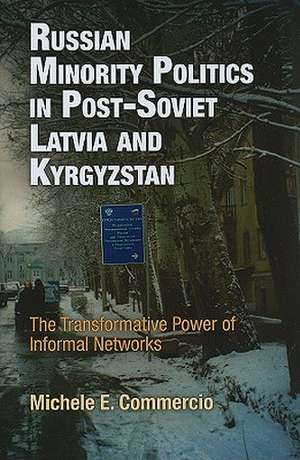Russian Minority Politics in Post–Soviet Latvia – The Transformative Power of Informal Networks: National and Ethnic Conflict in the 21st Century
Autor Michele E. Commercioen Limba Engleză Hardback – 21 apr 2010
Commercio asks why there is more out-migration and less political mobilization among Russians in Kyrgyzstan, a state that adopts policies that placate both Kyrgyz and Russians, and less out-migration and more political mobilization among Russians in Latvia, a state that adopts policies that favor Latvians at the expense of Russians. Challenging current thinking, she suggests that the answer to this question lies in the power of informal networks.
After the fall of the Soviet Union, the Communist party, Komsomol youth organization, and KGB networks were transformed into informal networks. Russians in Kyrgyzstan were for various reasons isolated from such networks, and this isolation restricted their access to the country's private sector, making it difficult for them to create effective associations capable of representing their interests. This resulted in a high level of Russian exit and the silencing of Russian voices. In contrast, Russians in Latvia were well connected to such networks, which provided them with access to the country's private sector and facilitated the establishment of political parties and nongovernmental organizations that represented their interests. This led to a low level of Russian exit and high level of Russian voice. Commercio concludes that informal networks have a stronger influence on minority politics than formal institutions.
Preț: 443.59 lei
Preț vechi: 498.41 lei
-11% Nou
Puncte Express: 665
Preț estimativ în valută:
84.89€ • 88.30$ • 70.08£
84.89€ • 88.30$ • 70.08£
Carte tipărită la comandă
Livrare economică 14-28 aprilie
Preluare comenzi: 021 569.72.76
Specificații
ISBN-13: 9780812242218
ISBN-10: 0812242211
Pagini: 248
Ilustrații: 14 illus.
Dimensiuni: 152 x 229 x 15 mm
Greutate: 0.54 kg
Editura: MT – University of Pennsylvania Press
Seria National and Ethnic Conflict in the 21st Century
ISBN-10: 0812242211
Pagini: 248
Ilustrații: 14 illus.
Dimensiuni: 152 x 229 x 15 mm
Greutate: 0.54 kg
Editura: MT – University of Pennsylvania Press
Seria National and Ethnic Conflict in the 21st Century
Notă biografică
Cuprins
A Note on Transliteration
PART I
Chapter 1. "What the Hell Kind of 'Non-Native' Am I"?
Chapter 2. Informal Networks, Exit, and Voice
Chapter 3. Soviet Socialist Legacies and Post-Soviet Nationalization
Chapter 4. Opportunity Structures and the Role of Informal Networks in Their Reconfiguration
PART II
Chapter 5. Native Versus Non-Native: Russian Perceptions of Post-Soviet Nationalization
Chapter 6. Russian Responses to Perceptions of Socioeconomic Prospects
Chapter 7. Ethnic Systems in Transition
Appendix: Methods
Notes
Bibliography
Index
Acknowledgments


























